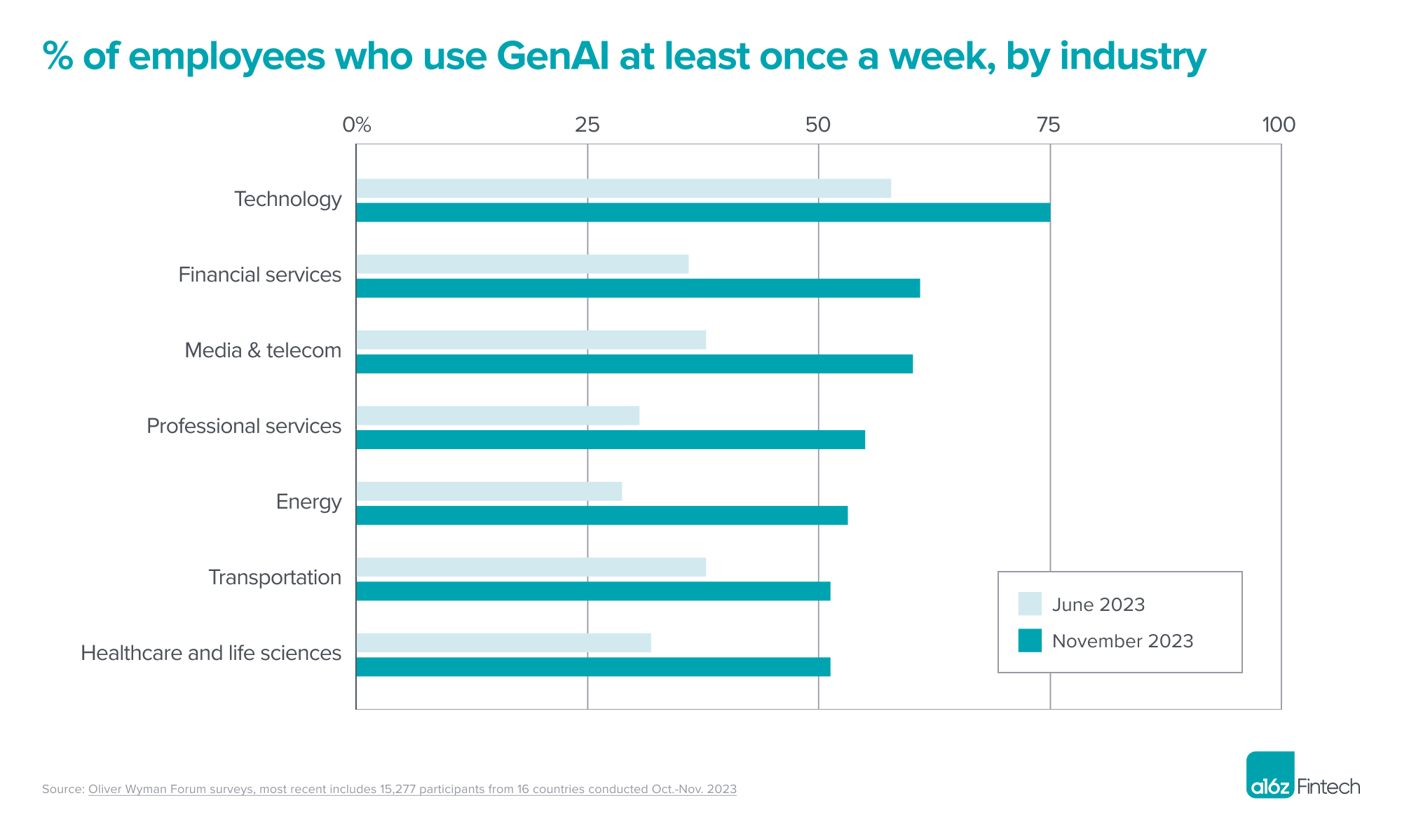This content first appeared in the February 2024 Fintech newsletter. If you’d like more commentary and analysis about news and trends from the a16z Fintech team, you can subscribe here.
|
In this month’s Fintech newsletter, we’re excited to launch some new features: a monthly Q&A with a fintech leader and a “chart of the month” on a market trend that catches our eye. Let us know what you think at fintechnewsletter@a16z.com and we’ll see you in March! |
Capital One’s Discover Plan
Marc AndruskoIf you follow financial services, then you’re probably already aware that Capital One announced its intention to acquire Discover last week. Priced at $35.3 billion, or roughly a 28% premium to Discover’s market cap at the time, the deal would be the largest merger of 2024 thus far. (As always, Marc Rubinstein covers the issue eloquently in his newsletter Net Interest.)
We assume 3 primary motivations for the acquisition, all of which regulators will likely scrutinize closely.
- Scale — the merger would create a pro forma $250 billion credit card loan book, which would be the largest in the country, surpassing J.P. Morgan’s $211 billion.
- Regulatory arbitrage — Discover is carved out from the Durbin Amendment, which would mean a higher rate of debit interchange revenue for the combined entity.
- The creation of a large closed-loop network — the combined entity would operate as both the issuer and network at scale, which creates opportunities to provide merchants with more granular data and unique value-added services.
It’s a long way from complete, and we’re excited to follow along! But that’s not all that happened in February – read below for more.
Three Questions with… Jamil Khan, H&R Block
“The amount of innovation we’re about to see in tax is unparalleled in recent history,” says Jamil Khan, the Chief Strategy and Small Business Officer for tax giant H&R Block. “But we know that with something like tax, having a trusted human checking, monitoring, making sure things are right, is key. Since we already have the human talent, we’re also now investing in the technology.”
Since joining H&R Block five years ago, Khan has been focused on helping the company grow not only its leadership in the field of assisted tax prep, but also its small business and financial products segments. In today’s environment, that can only mean one thing: investing in AI.
We recently asked Khan how H&R Block is using AI, as well as what advice he would give founders looking to build in this space.
How is H&R Block using generative AI?
Last year, we partnered with Microsoft to build and launch a GenAI tax assistant. Our model is trained on 70 years worth of tax data and insights, and helps answer users’ questions as they file their taxes, so they can maximize their refunds and minimize their tax liability. But this is just a first step. Beyond tax, we are also working on ways AI can augment key corporate functions like customer support and marketing.
What’s the biggest challenge facing H&R Block today?
Like many other companies, our biggest challenge is prioritization and figuring out where to focus our resources. We have so many opportunities to grow the company — the trick [to being successful] is having the discipline to focus on what really matters. I’d also add that as advice to early stage founders – figure out where you can have the biggest impact and focus your resources on that one area, versus being pulled in too many directions.
What other advice do you have for early stage founders building in tax and accounting?
Based on all the internal consumer research we’ve done, people are willing to try out AI for things like tax, accounting, and legal services, but they are still nervous about relying solely on machines given how new everything is. These are very important things to get right, because the consequences of a mis-filed return could be significant. This is people’s money! My advice would be to focus on how technology could enhance and augment human activity — how it could collaborate with humans to make the customer experience better. Also, think about how to help bigger companies like H&R Block do our job better… and get in touch if you can help!
This Month in Fintech News
- The CFPB released the initial results from its Terms of Credit Card Plans survey, which found that large banks are offering worse credit terms and interest rates than small banks or credit unions.
- Iran used two of the UK’s biggest banks to evade sanctions and move money around the world in a wide-ranging scheme, The Financial Times reports.
- Visa announced new digital wallet capabilities within Visa Commercial Pay this month, including the ability for financial institutions to add virtual corporate cards into an employees’ digital wallet.
- Michael Hsu, acting Comptroller of the Currency, called for a federal money transmitter license in a talk at Vanderbilt University. He said the current U.S. patchwork of state licenses is a “regulatory gap that, if filled, could better balance innovation and financial stability.”
- The Department of Commerce unveiled the U.S. AI Safety Institute Consortium to “unite AI creators and users, academics, government and industry researchers, and civil society organizations in support of the development and deployment of safe and trustworthy artificial intelligence.” The Commerce Department also announced participants, which includes financial leaders Visa, Citigroup, Wells Fargo, and more.
- Consumers lost over $10 billion to fraud during 2023, the first time fraud losses have crossed that threshold, according to new data released by the FTC.



